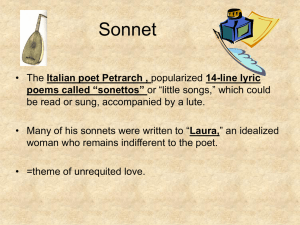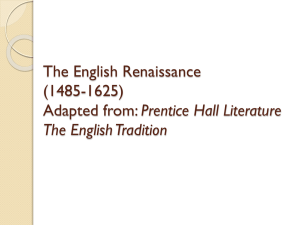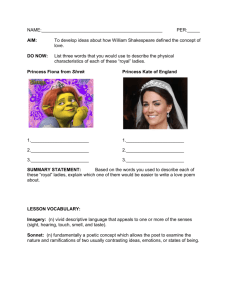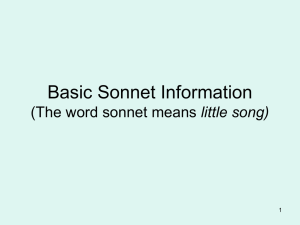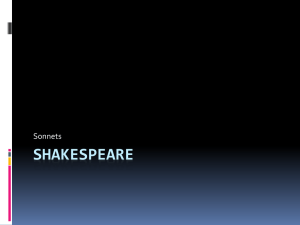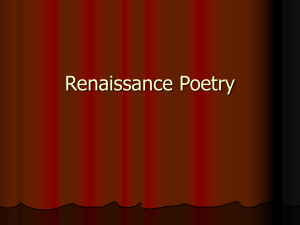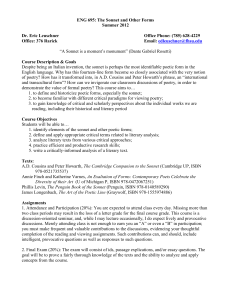university of kent – code of practice for quality assurance MODULE
advertisement
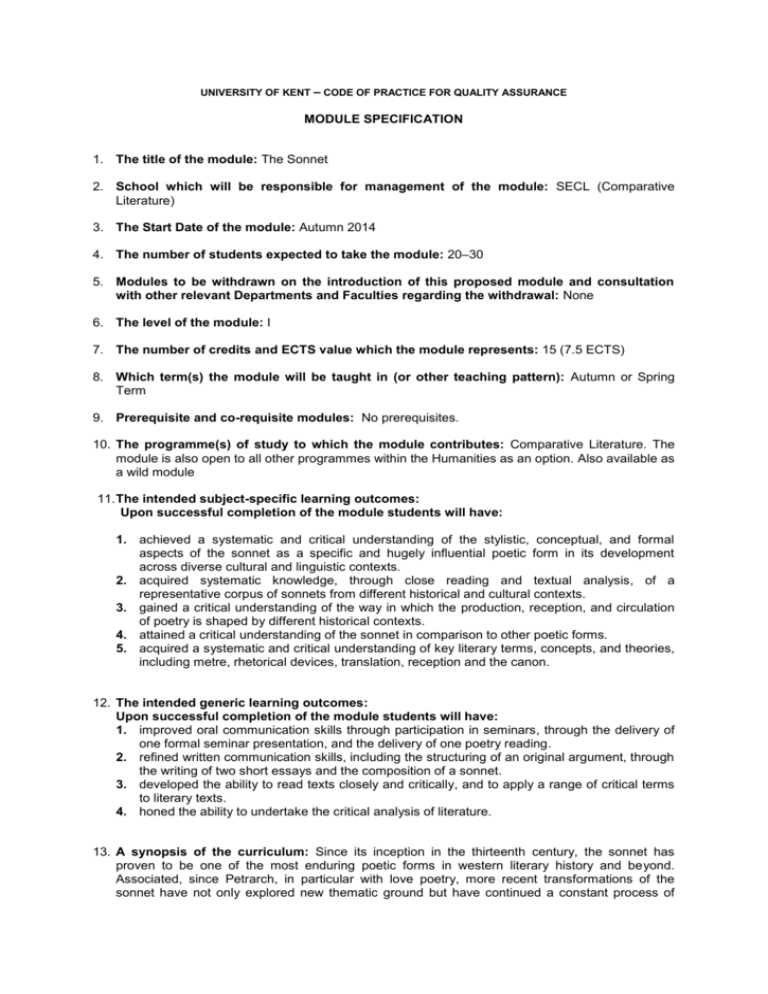
UNIVERSITY OF KENT – CODE OF PRACTICE FOR QUALITY ASSURANCE MODULE SPECIFICATION 1. The title of the module: The Sonnet 2. School which will be responsible for management of the module: SECL (Comparative Literature) 3. The Start Date of the module: Autumn 2014 4. The number of students expected to take the module: 20–30 5. Modules to be withdrawn on the introduction of this proposed module and consultation with other relevant Departments and Faculties regarding the withdrawal: None 6. The level of the module: I 7. The number of credits and ECTS value which the module represents: 15 (7.5 ECTS) 8. Which term(s) the module will be taught in (or other teaching pattern): Autumn or Spring Term 9. Prerequisite and co-requisite modules: No prerequisites. 10. The programme(s) of study to which the module contributes: Comparative Literature. The module is also open to all other programmes within the Humanities as an option. Also available as a wild module 11. The intended subject-specific learning outcomes: Upon successful completion of the module students will have: 1. achieved a systematic and critical understanding of the stylistic, conceptual, and formal aspects of the sonnet as a specific and hugely influential poetic form in its development across diverse cultural and linguistic contexts. 2. acquired systematic knowledge, through close reading and textual analysis, of a representative corpus of sonnets from different historical and cultural contexts. 3. gained a critical understanding of the way in which the production, reception, and circulation of poetry is shaped by different historical contexts. 4. attained a critical understanding of the sonnet in comparison to other poetic forms. 5. acquired a systematic and critical understanding of key literary terms, concepts, and theories, including metre, rhetorical devices, translation, reception and the canon. 12. The intended generic learning outcomes: Upon successful completion of the module students will have: 1. improved oral communication skills through participation in seminars, through the delivery of one formal seminar presentation, and the delivery of one poetry reading. 2. refined written communication skills, including the structuring of an original argument, through the writing of two short essays and the composition of a sonnet. 3. developed the ability to read texts closely and critically, and to apply a range of critical terms to literary texts. 4. honed the ability to undertake the critical analysis of literature. 13. A synopsis of the curriculum: Since its inception in the thirteenth century, the sonnet has proven to be one of the most enduring poetic forms in western literary history and beyond. Associated, since Petrarch, in particular with love poetry, more recent transformations of the sonnet have not only explored new thematic ground but have continued a constant process of experimentation and innovation within the formal constraints of the genre. In this module, the poetic form of the sonnet will be explored from its very beginnings to the present day. Moreover, sonnet cycles, such as Shakespeare’s or Rilke’s, will be studied as examples of the thematically guided expansion of the form. In addition to the printed poetic texts, attention will also be given (where applicable) to their artistic transformation in the visual arts, performance, and music. Sonnets to be studied will include samples by poets such as Petrarch, Ronsard, Michelangelo, Shakespeare, Gryphius, Lermontov, Borges, and Rilke as well as lesser known and more unconventional poems. 14. Indicative List: Primary reading will typically include sonnets inter alia by: Giacomo da Lentini Petrarch (i.e. Francesco Petrarca) Thomas Wyatt Pierre de Ronsard Edmund Spenser Michelangelo Buonarroti William Shakespeare John Milton Andreas Gryphius Elizabeth Barrett Browning Christina Rossetti Rainer Maria Rilke Mikhail Lermontov Jorge Luis Borges Seamus Heaney Brian Clark Secondary Reading: Cousins, A. D. and Peter Howarth. The Cambridge Companion to the Sonnet. Cambridge: CUP, 2011. John Fuller. The Sonnet. London: Methuen, 1972. Phelan, J. P. The Nineteenth-century Sonnet. Basingstoke and New York: Palgrave Macmillan, 2005 Spiller, Michael R. G. The Development of the Sonnet: An Introduction. London: Routledge, 1992. 15. Learning and Teaching Methods, including the nature and number of contact hours and the total study hours which will be expected of students, and how these relate to achievement of the intended learning outcomes: Study Hours: One weekly two-hour seminar for ten weeks Contact Hours: 20 Total Study Hours: 150 Seminars will generally include a presentation (typically of 15 mins individually) by small groups of students (relating to LO 11.1-5, 12.1 and 12.3-4). Having completed the preparatory reading for each week’s seminar, students will be in a position to contribute to seminar discussions, which will include focusing in detail upon individual sonnets as well as considering their broader cultural context. This will encourage the development of close-reading skills and the critical and systematic understanding of the emergence as well as the historical and geographical dissemination of the sonnet (relating to LO 1-5, 12.4). The written assessment consists of two 1,500 word essays. The first essay will comprise the composition of a sonnet and a critical reflection on the composition process (including metre, structure, and the use of rhetorical devices; relating to LO 11.1, 11.4-5, and 12.2-4), the second essay will consist of a comparative analysis of sonnets from different historical and/or cultural contexts (relating to LO 11.1-5, and 12.2-4). The module will conclude with a poetry reading in which the students’ works will be presented in conjunction with a selection of sonnets from across the centuries (relating to LO 12.1 and 12.3). These learning and teaching methods will contribute to achieving all of the subjectspecific and generic learning outcomes: 11.1-5 and 12.1-4. 16. Assessment methods and how these relate to testing achievement of the intended learning outcomes: 100% Coursework All students will give one in-class presentation on a selection of texts to be studied (20 per cent) and complete two essays of 1,500 words each (40 per cent each). The in-class Presentation will test learning outcomes: 11.1-5, 12.1 and 12.3-4 The essays will test learning outcomes: 11.1-5, 12.2-4 17. Implications for learning resources, including staff, library, IT and space: None 18. The School recognises and has embedded the expectations of current disability equality legislation, and supports students with a declared disability or special educational need in its teaching. Within this module we will make reasonable adjustments wherever necessary, including additional or substitute materials, teaching modes or assessment methods for students who have declared and discussed their learning support needs. Arrangements for students with declared disabilities will be made on an individual basis, in consultation with the University’s disability/dyslexia support service, and specialist support will be provided where needed. 19. Campus(es) where module will be delivered: Canterbury

